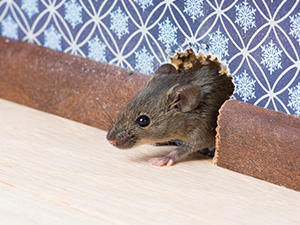Why Mice Will Not Leave On Their Own
Serving Atlanta Metro | Columbus | Augusta | Savannah

Imagine being exposed to the harsh outdoor elements, facing constant threats, only to discover a warm, welcoming shelter that offers you food and warmth throughout the winter. Wouldn’t you be tempted to stay? This scenario mirrors the inclinations of mice. When your home becomes an all-inclusive resort offering shelter, sustenance, and warmth, mice are inclined to become permanent residents, particularly in secluded areas like attics or within the walls. If you have mice visitors in your home this is a must-read.
Why Do Mice Enter Homes?
Mice enter homes for a variety of reasons, all of which revolve around their basic needs for survival. Here’s a look into why these small creatures may find your home appealing:
- Shelter: Mice seek out warm, secluded places to nest, breed, and hide from predators. Homes provide the perfect environment, especially during colder months.
- Sustenance (Food): Mice have voracious appetites and will consume a wide range of food, making your home a perfect source of nourishment.
- Hydration (Water): Like all living beings, mice need water to survive. Homes often provide easy access to water through leaky pipes, pet water dishes, or even condensation.
- Access Points: Homes with small openings provide easy access for mice. These can be cracks in the foundation, gaps around windows or doors, or openings for utility pipes and wires.
- Safety from Predators: Inside a home, mice are less exposed to natural predators like snakes, hawks, or owls, making your home a safe haven.
- Breeding Ground: Homes provide an ideal environment for mice to breed rapidly and in safety, further exacerbating infestation issues.
Understanding these motivations can help homeowners take preventive measures, such as sealing up entry points, keeping living areas clean and free of food debris, and reducing clutter that could provide shelter for mice.
Say Goodbye to Pest Problems for Good!
Problems In Homes Caused By Mice
The mere sight of a mouse darting across your kitchen floor can be alarming, but it’s just the tip of the iceberg regarding problems mice can cause. These rodents have a propensity to gnaw on virtually anything, potentially harming the structure of your home, and personal items, and even posing a fire risk by damaging electrical wiring. Beyond the physical damage, mice are carriers of diseases and host parasites such as mites, fleas, and ticks, introducing additional health hazards into your home.
Why Do Mice Not Want To Leave?
Mice that have infiltrated your home are likely to use it as a revolving door, albeit without the intention of ever relocating their nests outdoors again, even when temperatures rise in spring. The abundance of food and water, coupled with the safety from predators that your home provides, makes it an unparalleled sanctuary. In the wild, mice seek shelter in natural hideouts for protection. Your home, particularly cozy spots like attics or crawl spaces, offers a superior alternative.
How To Remove Mice From Your Home
Preventive measures can help deter mice, but once they’ve established a presence, removing them can be challenging. Mice reproduce rapidly and can become adept at evading traps, making complete eradication a daunting task. For a thorough and effective solution, seeking professional pest control services is recommended.
Contact Active Pest Control which specializes in addressing infestations of mice and other common household pests, ensuring your home is free from unwelcome rodents.
Back to Rodent Exterminators, Control & RemovalWhy Mice Will Not Leave On Their Own in Georgia
Serving Your Pest Needs for Over 35 Years Across Georgia
